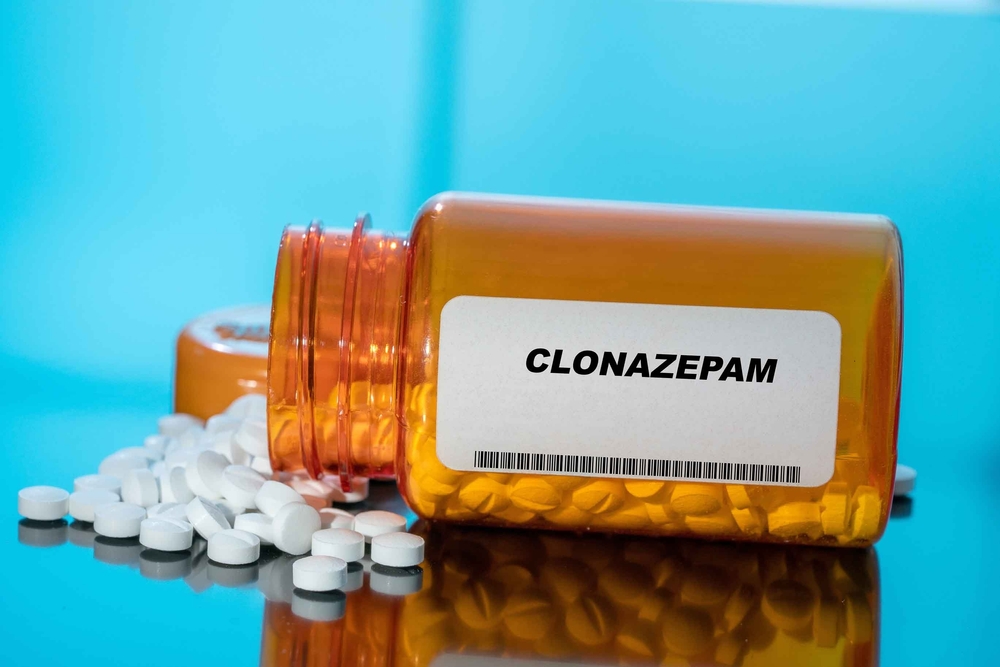Last Updated:
July 22nd, 2025
Clonazepam Rehab Treatment | What to Expect
Clonazepam is a benzodiazepine most often used to treat seizures, panic attacks and intense anxiety. But while clonazepam can be highly effective, it is also incredibly strong and taking more than prescribed, mixing it with other substances or staying on clonazepam too long can all be slippery slopes to addiction. Clonazepam addiction treatment provides medical support, emotional guidance and a clear plan for recovery so you don’t have to struggle alone any longer.

What is clonazepam addiction treatment?
Professional clonazepam addiction treatment is built around support, structure and safety. Programmes can vary but for the best results, a three-pronged approach is usually recommended:
- Clonazepam detox: Detox helps your body slowly get used to functioning without clonazepam. This is nothing like going cold turkey; it is a medically-managed process with 24/7 medical and emotional support.
- Clonazepam rehab: Rehab is about learning how to handle the things that made clonazepam feel necessary. It looks at your past, present and future and how to build a happier, healthier life for yourself
- Clonazepam aftercare: After rehab and detox, aftercare helps you keep what you’ve learned going. That might be regular therapy, advice for stressful moments or staying in touch with rehab alumni and therapists.
There doesn’t have to be a dramatic crisis to tell you that you need clonazepam addiction treatment. If you’re starting to feel like something isn’t right, see if any of these ring alarm bells:
- You’ve increased your clonazepam dose without your doctor’s say-so.
- You feel panicked when you’re close to running out.
- You’ve lied to your GP, your family or yourself about how much clonazepam you’re using.
- You’ve tried to quit but have relapsed because of clonazepam withdrawal symptoms
- Most of all, you’re reading this page because something inside you already knows you need help.
Stage one: Clonazepam detox
Detox is the name for the process of coming off clonazepam with professional help and care. It usually happens in a rehab centre or detox clinic where a medical team makes a personalised treatment plan, checks in on you regularly and ensures you’re safe.
The plan is to reduce your dose little by little to avoid any shocks to your system. That can help with clonazepam withdrawal symptoms, which you have most likely experienced if you’ve tried to quit or cut down before.
You will also be helped to stay comfortable with regular meals, hot drinks, fluids and time and space to rest. Medication may be offered if symptoms are too intense and you can talk to someone whenever you need to.
Clonazepam withdrawal symptoms and detox timeline
Clonazepam has a long half-life, which means it leaves your system more slowly than some other benzodiazepines. That might sound gentler but it can actually drag out the withdrawal process and make symptoms linger for a frustratingly long time. Here is what to expect:
- Restlessness
- Trouble falling or staying asleep
- Increased anxiety or irritability
- Headaches or mild flu-like symptoms
- Panic attacks or deep anxiety
- Shaking or muscle twitches
- An upset stomach
- Trouble concentrating on anything
- Sensitivity to noise and light
- Low mood and even crying spells
- Foggy thinking
- Sleep disturbances
- Ongoing cravings or restlessness
- Mild anxiety or mood swings
- Trouble sleeping
- Emotional numbness or hypersensitivity
- Fatigue
Each stage of withdrawal is tough in its own way but you will have people around you who know how to get you through it. If PAWS reactions do affect you, rehab will help you work through them safely.
Stage two: Clonazepam rehab
Once detox is complete, the next part of your recovery is clonazepam rehab. You will hopefully stay in the same place for both stages, which can make a huge difference because you already know the people and the routines.
This is when you begin the real work of understanding what pulled you toward clonazepam in the first place and how to change those patterns for good. That might mean talking about trauma, learning to manage your thoughts or just figuring out how to sit with hard feelings without running from them.
Clonazepam rehab gives you time and space to pause, take stock and start making sense of things. You will build tools for handling cravings, emotions and day-to-day stress so you don’t need clonazepam to act as a crutch.

What to expect from clonazepam rehab
Every clonazepam rehab programme has its own approach but the most effective ones offer a mix of therapies to help you work through the different layers of recovery. Here’s what to expect from a good rehab programme:
- One-on-one therapy to talk openly about the pressure, panic or pain that made clonazepam feel necessary
- Group therapy to hear from others in similar situations and build a sense of support and shared strength
- CBT to help you change your reactions and reduce the triggers that fuel addictive patterns
- Family therapy for rebuilding trust and communication if that’s something you need to work on
- Motivational Interviewing to keep you connected to your own reasons for recovery
- Creative or calming therapies like yoga or art to process things you might not have words for yet
Aftercare to help prevent a clonazepam relapse
Even after detox and rehab, the early days back home can feel shaky, so having a clear plan for support really matters. When choosing a clonazepam addiction treatment programme, look out for these aftercare services:
Begin clonazepam addiction treatment today
Clonazepam addiction can be confusing, lonely and hard to explain but you don’t have to go through it in silence. Addiction Helper can connect you with a rehab centre that understands exactly what you’re facing and can walk with you through every part of recovery. Get in touch with us today for expert advice.
Our compassionate team are ready and available to take your call, and guide you towards lasting the lasting addiction recovery you deserve.
Frequently Asked Questions
(Click here to see works cited)
- Durrani, Mateen. “Benzodiazepine Rehab | Benzodiazepine Addiction Treatment.” Linwood House, 8 January 2025, https://www.linwoodhouse.co.uk/rehab-treatment/prescription-drug/benzodiazepine/. Accessed 13 June 2025.
- Pétursson, H. “The benzodiazepine withdrawal syndrome.” PubMed, 1994, https://pubmed.ncbi.nlm.nih.gov/7841856/. Accessed 13 June 2025.
- Recovery Lighthouse. “Clonazepam Addiction Treatment | Clonazepam Rehab & Detox.” Recovery Lighthouse, 27 January 2025, https://www.recoverylighthouse.com/rehab-treatment/prescription-drug/benzodiazepine/clonazepam/. Accessed 13 June 2025.

